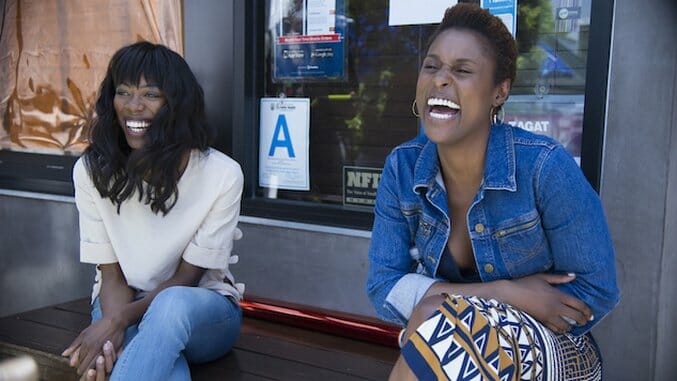Every week, critic Hari Ziyad breaks down the mechanics of a particularly excellent Insecure scene, joke or character. This week, it’s all about who’s allowed to be sexually fluid—and who isn’t.
Black cisgender straight women and Black cisgender queer men have long needed to have a serious conversation, one that’s far too frequently ignored. Queer men have historically been willing participants in sexism, and often use their queerness as a shield against critique. Meanwhile, many straight women have held tightly onto queer-antagonistic views, often acting as the primary antagonists of their queer children, and reinforcing a sexual and gender binary that contributes to the same masculine violence Black men then use against them. (Both of these communities need another serious conversation with transgender and gender-nonconforming people, but that’s an essay for another day).
Insecure leaps headfirst into the dialogue in “Guilty as F—.” Waking up at her former flame Jered’s house after the terrible, hangover-inducing date I described last week, Molly is able to convince him to forgive her and they pick up where they left off. A few dates in, Molly starts to spill about her “wild” past: sleeping with a college professor, doing cocaine, and making out with a girl at a frat party.
As casually as she admits her past, Jered also confesses to messing around with a guy when he was 20. “My friend and I were at this party in New York, I was super drunk, we went back to his place, and it just kind of happened,” he explains. “He went down on me.” Immediately, Molly’s face drops. She incessantly badgers him with clarifying questions, concerned that it might not be a one-time thing like he said, and that he may be gay or bi. He assures her it was “one guy, one time, that’s it,” but she can’t get over it that easily and takes her concerns to her group of girlfriends.
Though Issa assures Molly that she has nothing to worry about, reminding her of her own girl-on-girl experience, their other friend, Tiffany, explains that “it’s different for women.” Issa interjects that were Jered white this would be a non-issue, but Molly eventually sides with Tiffany, and breaks up with Jered once she realizes she won’t be able to get over his revelation.
I’ve had many conversations with Black women that have gone similarly. There seems to be widespread agreement that Black women should have more space to explore their gender and sexuality than Black men, who are groomed from childhood to invest in an untarnished idea of masculinity that even their female partners often reinforce.
But this unquestioned masculinity is the same that fuels the abuse of women and femme people, as demonstrated by the recent hashtag #masculinitysofragile. Because manhood is so easily threatened—even by touching another man and summarily deciding the experience isn’t for you—it must be protected at all costs, even and especially with violence. Of course, those who enact this violence are the ones who are ultimately responsible, and men—including queer ones—play a much larger role in upholding this patriarchal narrative. But none of us can ignore the part we play in upholding this culture if we are to rectify it.
Further, the “touch a dick as a man and you’re gay/unworthy of partnering with women” ideology erases all bisexual and queer men who do not reside on either end of the gay-straight binary. Their existence and lives become completely immaterial, and their realities and struggles remain unengaged.
The episode brings to mind Atlanta’s seventh episode, “B.A.N.,” in which the show tried (and some say failed) to start a conversation about transgender rights and the Black community. This, too, is a much-needed dialogue (though no more needed than in white communities), but without Black transgender people themselves represented and no hint that it will be further engaged, it was a dialogue that seemed incomplete.
Insecure does a great job of starting this conversation with its audience, but it also doesn’t come close to finishing it. Molly ultimately concedes to her own biases, and leaves an already forgiving Jered once again. But unlike Atlanta’s transgender episode, this plotline stays open-ended, offering hope it will reappear down the line. If those of us watching continue to engage our complicity in patriarchal cultures, too, we will all be the better for it.
Hari Ziyad is a Brooklyn-based storyteller and the Editor-in-Chief of RaceBaitR. Their work has been featured on Gawker
, Out
, Ebony
, Mic
, The Guardian, Colorlines
, Black Girl Dangerous
, Young Colored and Angry
, The Feminist Wire
and The Each Other Project
. They are also an assistant editor for Vinyl Poetry & Prose
and a contributing writer for Everyday Feminism
.